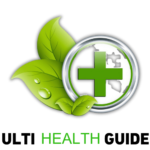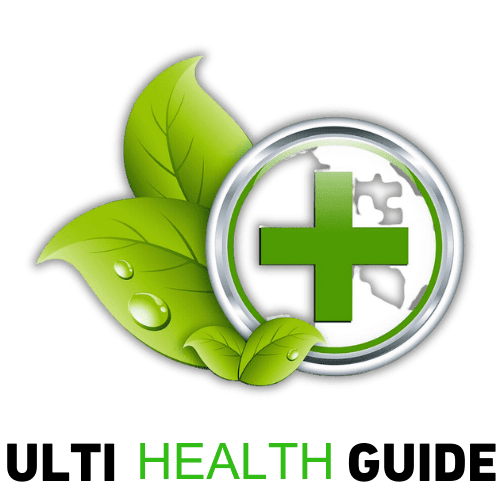What Are Flavonoids?
Flavonoids are a type of polyphenolic molecule. They are found in plant-based foods, and they are believed to play a role in health and disease prevention.
Flavonoids can be divided into six main subgroups:
- Anthocyanidins
- Flavanones
- Flavones
- Flavanols
- Proanthocyanidins
- Isoflavones
Health Benefits of Flavonoid Vitamin Supplements
- Antioxidant Effects
- Flavonoids Can Protect the Cardiovascular Health
- They Reduce the Risk of Diabetes
- Flavonoid Supplements May Boost the Immune System
- They May Protect Against Cognitive Diseases
- Flavonoids Enhance Bone Health and Blood Pressure
- Role of Flavonoids in Cancer Prevention
- Effect of Flavonoids on Smoking-Related Cancers
- Cancer Prevention in Women
- Role in Pain and Inflammation Management for Patients With Chronic Conditions
- Effect on Detoxification Pathways
- Treatment of Bacterial and Viral Infections
Quercetin Supplementation
Quercetin is a flavonoid in the pigments of various fruits, flowers, and vegetables. It belongs to the class of flavonoids with antioxidant properties.
Flavonol Quercetin Supplements
Typical daily dosages are between 500 and 1,000 mg. However, it isn't advisable to consume quercetin exclusively due to its limited bioavailability. You may also include vitamin C and digestive enzymes
Side Effects Of Quercetin
- Headaches
- Nausea
- Tingling feelings in the hands and feet
Precautionary Measures of Quercetin
- Pregnant and lactating women may safely consume quercetin in food.
- Pregnant and lactating women should avoid taking quercetin supplements if there's a lack of research on the supplement's safety.
- Check with your doctor before taking quercetin, as the supplement can interfere with several drugs, including antibiotics and blood pressure medications.
Best Functional Food Sources of Flavonoids
- Berries
- Kale
- Red cabbage
- Dark Chocolate
- Tea
- Citrus Fruits
- Soybeans
- Parsley


- Quercetin 500mg Supplement: Quercetin Dihydrate to Support Cardiovascular Health - Max Strength Powder Complex Pills to Help Improve Anti-Inflammatory & Immune Response

- Lipo-Flavonoid Plus, Tinnitus Relief for Ringing Ears, OTC Flavonoid Ear Health Vitamins, Bioflavonoids & Vitamin C, 150 Caplets

- Lipo-Flavonoid Advanced Hearing Support Daily Supplement to Help Reduce The Risk of Hearing Decline and Promote Optimal Hearing, 40 Count Caplets
Dietary supplements are becoming popular globally. In alternative medicine, people use flavonoids, a common joint supplement, for various purposes.
Flavonoid supplements have many health benefits and act with several dietary factors. Some foods have flavonoids that can help your brain work better. They boost a chemical called dopamine, which makes learning and thinking easier. We've made a guide about flavonoids and a list of the best ones you can eat to stay healthy. Remember, the FDA checks these supplements, but they're not made to cure or stop any sickness.
They're used to support the healthy function of the brain, heart, skin, eyesight, kidneys, bones, and joints.
What are flavonoids? (biochemical makeup of flavonoids)
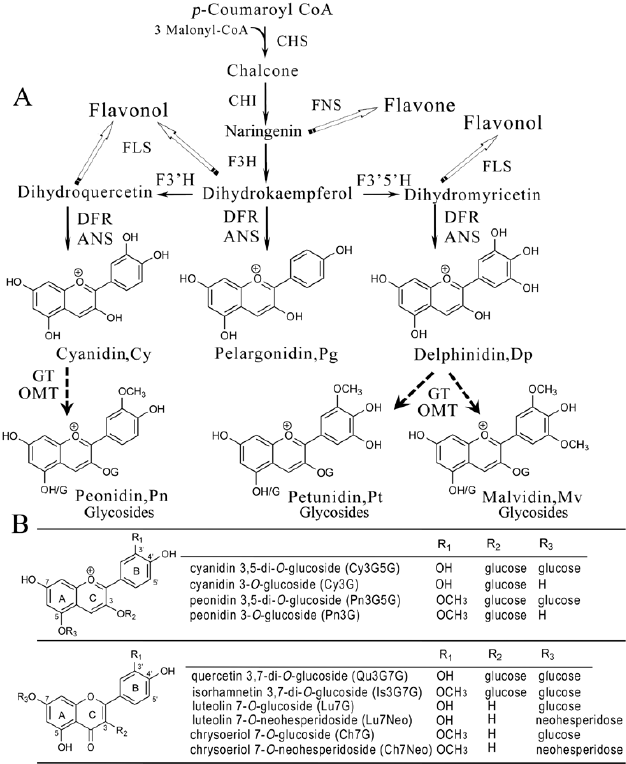
Flavonoids are special molecules found in water, like the ones in tea. These molecules are made of phenolic groups and have 15 carbon atoms. They're built from two benzene rings connected by a short chain of three carbons. One carbon from this chain joins with a benzene ring to make a third ring in the middle, sometimes using an oxygen bridge.
There are six main types of flavonoids:
- Flavonols
- Flavones
- Isoflavonoids
- Flavanones
- Anthoxanthins
- Anthocyanins
For example, anthoxanthins give some flowers their yellow color. On the other hand, anthocyanins make buds red and fall leaves purple-red. Plants have a lot of flavonoids and use them for different things. [1]
These flavonoids are like paint for plants, helping them show off colors to attract bugs for pollination. They also shield plants from harsh sunlight, assist them in using nutrients, control how they grow, and let cells talk to each other.
Some veggies, like peas, clover, and beans, work together with tiny organisms called rhizobia. Flavonoids from plant roots help this teamwork. When plants sense flavonoids, they react by adjusting some things inside them and growing small bumps on their roots. Some flavonoids even stop harmful spores, keeping plants healthy.
Now, what about animals and us?
Many plants have flavonoids, and they're safer than some other chemicals. This means both animals and people can eat a good amount without feeling bad. Foods like onions, parsley, blueberries, bananas, dark chocolate, and red wine are rich in flavonoids. Only plants can give us these flavonoids because of their unique parts.
If you're thinking of taking flavonoids as a health boost, remember a few things. They might not mix well with some medicines, and too much might not be good. Also, taking a lot of flavonoid supplements might mess with the levels of some vitamins in your body, like the vitamin C in oranges and lemons.

Health benefits of flavonoid vitamin supplements
Flavonoid supplements can be good for your health and help with different health problems. The coolest thing is that they might help prevent cancer and keep your heart and blood vessels healthy. [2] [3]
Here are some potential health benefits of flavonoid supplements:
Antioxidant effects
Research shows that flavonoid supplements have antioxidant effects and an important chemical structure.
They protect your DNA from damage and prevent reactive oxygen species from destroying cells. Additionally, flavonoids bind to fatty acids and stop them from building up. This effect contributes to the maintenance of your physical health and fitness.[4]
Flavonoids can protect the cardiovascular health
Flavonoids, which are special parts found in many plants like fruits and veggies, are great for our health. They help protect our heart and blood system. As we get older, our risk for heart problems and other diseases increases, but flavonoids can fight against these effects.
Taking flavonoid supplements can slow down heart problems and even lower the chances of memory issues like dementia. There's a lot of evidence that they can help with heart issues and high blood pressure. One cool thing they do is make our "bad" cholesterol healthier by getting rid of the harmful parts. This is because flavonoids have antioxidant properties, which means they fight off harmful stuff in our body. This can lower the chances of heart-related problems.
Flavonoids also help our blood vessels work better. They can make them wider and control how some cells inside them act. While we know flavonoids do many good things, new research suggests they might have even more benefits by connecting to different signals in our body. So, they're like multitaskers for our health! [5]
They reduce the risk of diabetes
A study from the UK showed that eating certain foods might help prevent type 2 diabetes. These special foods have something called flavonoids. The study found that women who ate a lot of these foods had fewer early signs of diabetes, like swelling and insulin issues.
What are these early signs? Well, they include things like inflammation and problems with insulin, a substance our body uses to control sugar. [6]
Most of the 2,000 people in the study got their flavonoids from tea. But you can also find them in grapes, pears, berries, oranges, peppers, and even wine. On average, people in the study ate about 1.2 grams of flavonoids each day. The women who ate certain types of flavonoids, like those in pears, apples, and blueberries, had the best results. They had the least swelling and insulin problems.
If someone has high sugar levels in their blood or insulin problems, it might mean they have diabetes. Eating foods rich in flavonoids can help our body in many ways. They help our body use sugar better and protect the cells that make insulin in our pancreas. They can also help control sugar levels in our liver.
In another big study with 200,000 people, they found that eating foods with flavonoids, especially from pears, apples, and blueberries, lowered the risk of getting diabetes.
Flavonoid supplements may boost the immune system
Taking flavonoid vitamins might help make the cells in your body stronger and better at fighting off sickness. It's like giving your body a little boost! Many studies say that some vitamins can protect our body from harmful things called free radicals and stop bad spots from forming inside us. Taking a daily dosage of either vitamin C or vitamin E can be beneficial in lowering the risk of developing heart disease. [7]
You can find out our idea on how to boost your immune system on What Does It Mean to Be Healthy?
They may protect against cognitive diseases
Some scientists believe that substances called flavonoids found in cocoa and green tea can make your brain work better. They do this by fighting something called free radicals and reducing swelling. People also think that flavonoids protect brain cells from getting hurt.
In studies with animals, they found that flavonoids can stop a thing called beta-amyloid plaque from building up in the brain. This plaque is like a sign of Alzheimer's disease. [8] Moreover, flavonoids might make the blood flow better in your brain, which is good for your heart and brain. So, it's like a double win – both your heart and brain benefit from flavonoids. Even though they are still studying this in people, the early results look good.
They found that people who eat a lot of flavonoids have a lower chance of getting Alzheimer's disease and memory problems. A group of scientists checked how 3,000 people ate, and these folks didn't have any memory issues. They learned this from a study called the Framingham Heart Study. The average age of these people was 59.
People who ate the most flavonoids (about 297 milligrams) every day for 20 years were less likely to get Alzheimer's or memory problems compared to those who had around 123 milligrams. They figured this out by comparing how much flavonoids the two groups ate.
Flavonoids enhance bone health and blood pressure
Flavonoids activate many cell-signaling pathways in vascular smooth muscle cells. These actions have the potential to contribute to the differentiation of osteoblasts and osteoclasts.
The growth of osteoblasts may in turn stimulate bone production. Adults and people of old age can benefit from this. Also, in 2016, scientists did a study and wrote about it in a journal called the Journal of Investigative Medicine (JIM). They checked how tea flavonoids affect the bones of animals and people. [9]
The scientists observed that even moderate tea consumption could be beneficial for supporting bone strength. They propose more research on the combination of flavonoids in conjunction with elements that promote bone health, such as calcium and vitamin D.
Furthermore, oranges and other citrus fruits are one of the most common sources of hesperidin, a form of flavonoids. Supplementation with roughly 300 mg of hesperidin per day for four weeks resulted in a large reduction in diastolic blood pressure of an average of 3.2 mm Hg. Healthy, overweight men received a placebo in this experiment. Still, the systolic blood pressure wasn't affected in any way by hesperidin. [10]
Role of flavonoids in cancer prevention
A big study that looked at lots of research over 11 years found that eating foods with something called flavonoids can lower the chance of getting different types of cancer.
These flavonoids are like super protectors because they have special powers called antioxidants. They can guard you against breast, prostate, and colorectal cancers. But here's the cool part: different types of flavonoids help with different cancers.
For instance, if you have anthocyanidins, it's like having a shield against lung cancer. And if you eat flavonols, it's like having armor against prostate cancer. So, the best way to get all these different flavonoids is to eat lots of different plants. They're like a superhero team protecting you from bad stuff!
Effect of flavonoids on smoking-related cancers
When people smoke, they have a higher chance of getting certain cancers in their throat, mouth, and stomach if they don't eat enough flavonoids. Flavonoids are like super-protectors found in some foods.
There are different kinds of flavonoids like flavonols, flavones, and flavanones. The parts of the body where these cancers can happen include the mouth, throat, voice box, food pipe, and stomach. They figured this out by looking at a bunch of studies where they compared people who got these cancers to people who didn't. In total, they looked at 19 studies where they asked people about their past and 15 studies where they followed people over time. [11]
Another study with eight experiments found that flavonoids can help protect smokers from getting lung cancer, but it didn't say that eating more flavonoids would lower their risk. So, if smokers eat more foods with flavonoids, it might help them avoid certain cancers in their throat, mouth, and stomach.
Cancer prevention in women
More research found that women who ate the most isoflavones, like daidzein and genistein, had a lower chance of getting a type of cancer called endometrial cancer. These are the compounds found in foods like soy.
But when it comes to ovarian cancer, they looked at a bunch of studies, and they couldn't find a connection with eating foods with flavonoids. Right now, we don't have a lot of proof that eating foods with flavonoids can protect us from different types of cancer. But we need to do bigger studies where we follow people over time to be more certain.
Also, they noticed that only women who have gone through menopause seemed to have a lower risk of breast cancer when they ate certain types of flavonoids. They figured this out by looking at four studies where they asked women about what they ate. [12]
Role in pain and inflammation management for patients with chronic conditions
Extensive analyses have established the anti-inflammatory and pain-relieving qualities of most flavonoids. According to research, flavonoids can dampen the cellular reaction to pain.
Researchers have hypothesized that flavonoids might be useful in the medical treatment of inflammatory illnesses and the management of chronic diseases. [13]
Effect on detoxification pathways
Flavonoids can change the liver and intestinal mucosa since cells recognize them as xenobiotics.
There are these things called phase II enzymes in your body, and they can transform flavonoids into different forms. They can make them into methylated, glucuronidated, or sulfated forms, depending on how they're built. [14]
Treatment of bacterial and viral infections
Research has shown that foods rich in flavonoids have beneficial effects against both bacteria and viruses. [15]
Bioavailability of flavonoids
Inside your stomach and intestines, there's a whole community of tiny organisms called gut bacteria. These little guys can affect how your body uses flavonoids from the food you eat.
Now, flavonoids are like health superheroes found in some foods. But, not all flavonoids are the same. Some are easy for your body to use, while others are not so easy. But even the ones that are harder to use can still be good for your health. Your body takes what it needs and gets rid of the rest.
But here's the twist: some things you eat or drink can either help or stop your body from using these flavonoids. For example, if you put milk in your tea, it might make the flavonoids less powerful. Milk has a type of sugar called lactose that can mess with the good stuff in tea. Also, there's a protein in milk called casein that can make the flavonoids 11–27% less effective. So, adding milk to your tea or coffee might not be the best idea if you want to get all the health benefits.
But some foods can actually help your body use flavonoids better. Like, if you eat pineapples, they have something called bromelain that helps your body digest protein. And vitamin C, which you can find in lots of fruits and veggies, also makes it easier for your body to use certain flavonoids.
So, it's all about what you eat and how you combine your foods that can affect how your body uses these flavonoids. And scientists are still learning more about it!
Types of flavonoids and their dietary sources
Flavonoids are found in numerous plant-based foods and beverages. Below is a list of the six subtypes of flavonoids and their food sources:
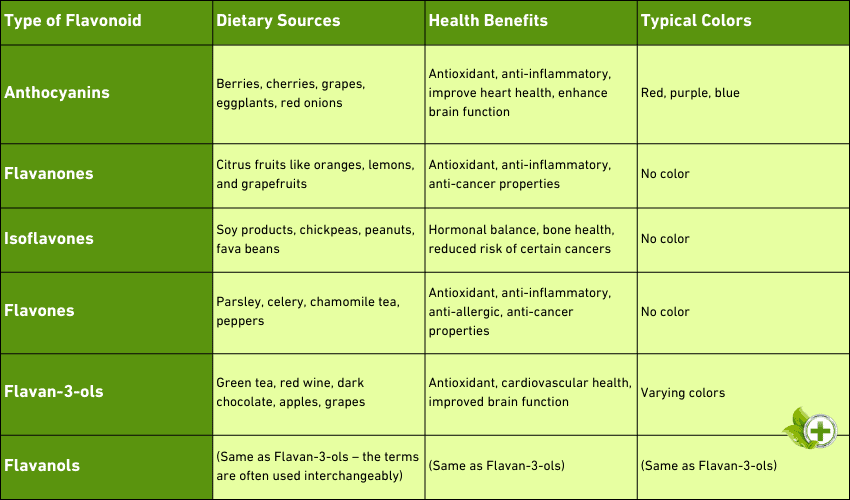
Flavanols
These particular kinds of flavonoids are well-known for their antioxidant properties. They could help in the management of symptoms associated with cardiovascular problems.
Diets rich in these flavonoids include kale, onions, black tea extracts, green tea extracts, broccoli, and tomatoes.
Flavan-3-ols
Flavonoids are plant phenolics that include the most prevalent and extensively dispersed compounds—flavones, flavonols, flavan-3-ols, anthocyanins, flavanones, and isoflavones. In terms of structure, flavan-3-ols are the most diverse subclass of flavonoids.
This class of flavonoids ranges from simple monomers like (+) catechin and its isomers (-) epicatechin, which can be hydroxylated to form gallocatechin and epigallocatechin, and complex mixtures like oligomeric and polymeric proanthocyanidins, which are also known as condensed tannins.
Numerous vascular functions are associated with the flavan-3-ol class of phenolic chemicals found in green tea extracts, cocoa beans, grapes, and their seeds. Non-gallate and gallate flavan-3-ol diets may protect against cancer, cardiovascular disease, diabetes, osteoporosis, and neurological illnesses when consumed for lengthy periods.
Food sources of flavan-3-ols include white tea, green tea, oolong tea, black tea apples, purple, red grapes, blueberries, strawberries, cocoa, and chocolate products.
Flavones
Flavones are the main pigment in yellowish-white (cream-colored) flowers and contribute to the colors of blue flowers.
They protect plants from intense ultraviolet rays. Dietary sources of flavones include thyme, celery, parsley, green olives, and hot peppers.
Flavanones
Flavones are notable for their ability to reduce inflammation in the body. They may also assist you in maintaining a healthy weight and lowering cholesterol levels.
Fruits that contain flavones include lemons, limes, orange, and grapefruit juice.
Isoflavones
Isoflavones may play a role in maintaining a healthy hormonal balance in the body. Isoflavonoids are most commonly found in soy, items made from soy isoflavones, and some other legumes like fava beans.
Anthocyanins
Anthocyanins are pigments created naturally and responsible for the red, purple, and blue colors of flowers.
Most of them are found in the outer skin of berries and products made from berries, such as grapes in red and purple tones, crimson wine, cranberries, blueberries, strawberries, and blackberries.
Quercetin supplementation
Quercetin is a flavonoid in the pigments of various fruits, flowers, and vegetables. It belongs to the class of flavonoids with antioxidant properties. Antioxidants seek and destroy particles in the body known as free radicals, which can be destructive to cell membranes, interfere with irreversible DNA, damage, and even trigger the death of cells.
Thus, quercetin neutralizes free radicals and helps prevent some damage caused by free radicals. When you examine quercetin in a test tube, it shows strong antioxidant activity.
But, it's uncertain whether ingesting quercetin (or several other antioxidants) has the same effects on the body. In test tubes, animals, and other preliminary investigations, certain natural substances, such as citrus flavonoids, especially quercetin, have shown antihistamine properties.
Still, no studies have examined whether these compounds help lessen allergic reactions in humans. Some data shows that quercetin can prevent cardiovascular problems and cancer. Quercetin helps to stabilize the body cells responsible for histamine release due to its anti-inflammatory and antihistamine effects. [16]
Flavonol quercetin supplements
The dietary supplement quercetin is available online and in health food stores. It comes in capsules and powders, among other forms.
The typical daily dosages are between 500 and 1,000 mg. But, it isn't advisable to consume quercetin only due to its limited bioavailability. You may also include vitamin C and digestive enzymes, such as bromelain, in the supplementation since they aid in absorption.
Furthermore, quercetin may enhance the effects of other flavonoid supplements, including resveratrol, genistein, and catechins, according to some studies.
Side effects and precautionary measures of quercetin
Various fruits and vegetables contain the antioxidant quercetin, which is healthy to eat. There are no known adverse effects when it's taken as a supplement.
Still, overdosing on quercetin can induce moderate side effects, such as headaches, nausea, or tingling feelings in the hands and feet. Take the following precautionary measures when ingesting quercetin:
- Pregnant and lactating women may safely consume quercetin in food.
- Pregnant and lactating women should avoid taking quercetin supplements if there's a lack of research on the supplement's safety.
- Check with your doctor before taking quercetin, as the supplement can interfere with several drugs, including antibiotics and blood pressure medications.
Best functional food sources of flavonoids
Some food sources contain considerably high amounts of flavonoid. [17] Here are some functional foods rich in flavonoids:
Berries
If you're a fan of berries, you can consider yourself lucky, as these fruits are flavonoid-rich. You can find these powerful nutrients in every variety of berries, which is great news for anyone who enjoys eating berries.
Cherries, blueberries, blackberries, strawberries, and raspberries are among the fruits packed full of flavonoids. Which variety of berries holds the most significant concentration of flavonoids?
When it comes to berries, blackberries are particularly remarkable because they have all six subclasses of flavonoids and elevated levels of anthocyanins, which are both beneficial to the health of blood vessels and the cardiovascular system. Mixed berry extracts are also an excellent food choice. Researchers have discovered that this specific food source may offer potential protection against cancer. Blueberries are ideal dietary flavonoid sources since they have a high concentration of anthocyanins and flavan-3-ols.
Kale
Kale is one of the best food sources of flavonoids. It shouldn't come off as much of a surprise, given that kale is a nutritious vegetable. It's difficult to find a dark leafy green that delivers as many benefits to one's health as kale does, and you can add flavonoids to its already extensive list of health benefits.
The subclass of flavanols with potent antioxidant abilities is abundant in kale. Hence, this vegetable may be good for preventing cardiovascular disorders and improving general heart health.
Red cabbage
Red cabbage is another vegetable rich in anthocyanins, a subclass of flavonoids shown to have potential anticancer properties and is also beneficial to cardiovascular health.
A single serving of this vegetable contains an astounding 72.98 milligrams of total anthocyanins per one hundred grams of weight. Red cabbage may not be as popular as green cabbage, its famous relative. Yet, it offers many health benefits, including high levels of vitamin K and fibers.
Dark chocolate
If you're a fan of chocolate, you should know that every time you ingest something chocolaty or cocoa-based, you're giving your body a healthy dose of flavonoids. You can find flavonoids in high concentrations in cocoa, chocolate, and cocoa powder. Still, dark chocolate has a higher flavonoid content.
A 100-gram serving of dark chocolate has more than 100 milligrams of flavan-3-ols, a type of flavanol that you may be more familiar with under catechins. Catechins are nutrient-dense and beneficial for various health concerns, including inflammation, metabolic syndrome, and cancer prevention. Catechins are also abundant in green tea, a good source of these nutrients.
Cocoa is rich in flavan-3-ols, and several studies suggest that it may be effective in conditions such as metabolic syndrome, fatty liver disease, brain health, and even bone strength. But, you need to choose unsweetened chocolate to enjoy the health benefits of cocoa and its flavonoid content.
Tea
You've learned the wonderful advantages of drinking green tea in previous sections of this blog. But, the health benefits of tea aren't limited to this particular variety; almost every type of tea can provide you with a large quantity of flavonoids.
Black, green, and oolong teas contain flavan-3-ols in high concentrations. These types of tea are particularly abundant in this subclass of flavonoids due to the high catechin concentration of green, white, and oolong tea.
Meanwhile, black tea provides flavonols and some flavan-3-ols (theaflavins and thearubigins) that aren't found in green, white, or oolong teas. You may gain more rare variants of flavonoids from sipping black tea than you would get from drinking green, white, or oolong tea. Regardless, you'll get a large quantity of flavonoids from any type of tea, as all warm beverages contain flavonoids.
Citrus fruits
You know that citrus fruits like oranges are famous for having lots of vitamin C, which is great for your health. But there's another cool thing about them. They also have something called flavanones, which are like special helpers that can make your body less inflamed, like when you get a swollen or sore spot.
Citrus fruits, like oranges, have a ton of these flavanones. And when you make fresh juice from them, you get even more of these helpful flavanones. It's like giving your body a super boost of goodness! For example, if you compare eating slices of raw grapefruit to drinking grapefruit juice, the juice can have a lot more flavonoids, which are those helpful things we're talking about. So, juice can give you even more of the good stuff.
Now, do you like eating fresh fruit or drinking fruit juice? Here's a fun fact: when it comes to oranges, you get more flavonoids from eating the fruit itself. One serving of oranges has about 42.57 milligrams of flavonoids, while one serving of fresh orange juice has about 29.48 milligrams. So, sometimes eating the fruit is the way to go for that extra boost of goodness!
Soybeans
Soybeans are the best source of a specific type of flavonoid known as isoflavones, irrespective of their obtained form. They have a high concentration of isoflavones, which contribute to regulating hormones throughout the body.
Although isoflavones aren't essentially found in other foods (black beans offer a small amount), you'll get a good dose of them in every form of soybeans, from edamame to tofu to tempeh soy milk.
Other foods, like black beans, offer fewer amounts of isoflavones. It's best to stick with organic options because genetically modified organisms (GMOs) can be found in some soy crops.
Parsley
Parsley may not play other roles in your dining room apart from garnishing or spicing your meals. But, this food source deserves more attention than it gets. This easy-to-grow green herb isn't only flexible; it's also one of the foods with the highest concentration of flavonoids.
It's rich in flavones, a subclass of flavonoids excellent for reducing inflammation. The flavone content of fresh parsley is around 227 milligrams per 100 grams, whereas the flavone content of dried parsley is an even more remarkable 13,525 milligrams per 100 grams.
Effects of flavonoid supplements on drugs
It's best to consult your healthcare provider or other qualified medical experts before using dietary supplements, including flavonoid supplements. These compounds can interact with various medications, both those that need a prescription and those that do not.
So, they may downplay or amplify the effect of drugs. Some flavonoids can impede P-glycoprotein and other ATP-binding cassettes (ABC) from functioning. This action may increase the toxicity of medications that are substrates of P-glycoprotein after consuming supplements. Some drugs that fall within this category are calcium channel blockers, cyclosporin, digoxin, and erythromycin. Once again, researchers have identified several anthocyanins and anthocyanins that inhibit BRCP-mediated transport.
Certain flavones, isoflavones, flavonols, and flavanones have also played a role in this event. They may interact with medications, such as anticancer drugs, antibiotics, beta-blockers, and antiarthritics. Meanwhile, researchers have reported that some flavonols, flavanones, and isoflavones inhibit multidrug resistance proteins. This interaction may affect the MRP-mediated transport of many anticancer drugs.
Possible side effects of flavonoid supplements
Like other supplements, you need to follow the recommendations printed on the bottle before taking a flavonoid supplement. If you consume an excess dose of flavonoid supplements, you risk experiencing adverse consequences.
For instance, taking extremely high doses of quercetin, such as 51.3 mg/kg of body weight, has been linked to kidney toxicity. On the other hand, research conducted with doses ranging from 3 mg to 1,000 mg per day for up to three months hasn't shown any negative signs or antagonistic effects.
Green tea extracts can cause several gastrointestinal side effects when taken in doses of six grams per day. These side effects include;
- nausea
- vomiting
- abdominal pain
- diarrhea
Side effects may also occur when the extracts are taken in three to six divided doses. In addition, flavonoid supplements may affect how certain prescription drugs work in the body. They may make it more likely for the drugs to be harmful or increase the odds of overdosing on some particular substances.
How to choose the best flavonoids supplements (buyer's guide)
Finding the best flavonoid supplements can be challenging initially. Yet, it's not always easy for longtime customers to determine which product best suits their needs.
Therefore, we've identified some elements to consider when selecting the best flavonoid vitamin supplements. These factors include:
Price
It would help to examine the prices of various flavonoid products before buying. If you aren't in a particularly urgent situation, such as an emergency, it's a good idea to wait for a sale.
Brand
It's best to compare flavonoid supplement brands before buying, even if the brand doesn't matter to one product as much as it does to another.
Function
When a supplement has high functionality, its specifications will be more in-depth. Thus, you must understand how a flavonoid supplement works before ordering it.
Ensure you check the details of your preferred flavonoid vitamin supplement and confirm if you can use them.
Customer reviews from other users
Most astute purchasers look up reviews from previous customers about their experiences using flavonoid vitamin supplement capsules and tablets. This step allows potential customers to decide if they can trust the product or not.
Best flavonoid supplements
We've studied and outlined the most effective flavonoid supplements on Amazon according to the following criteria:
- Substantial amounts of active substances
- The product's success in various clinical trials
- Numerous favorable reviews, ratings, and testimonials from past users or customers
- Minimum potential risks and side effects
- Adherence to Food and Drug Administration (FDA) guidelines and good manufacturing practice (GMP)
- The supplement should be easy to consume
- It must have proper packaging and in-depth labeling
- It should be gluten-free, non-GMO, and vegan-friendly
According to our survey, here are the top 3 flavonoid supplements on Amazon:
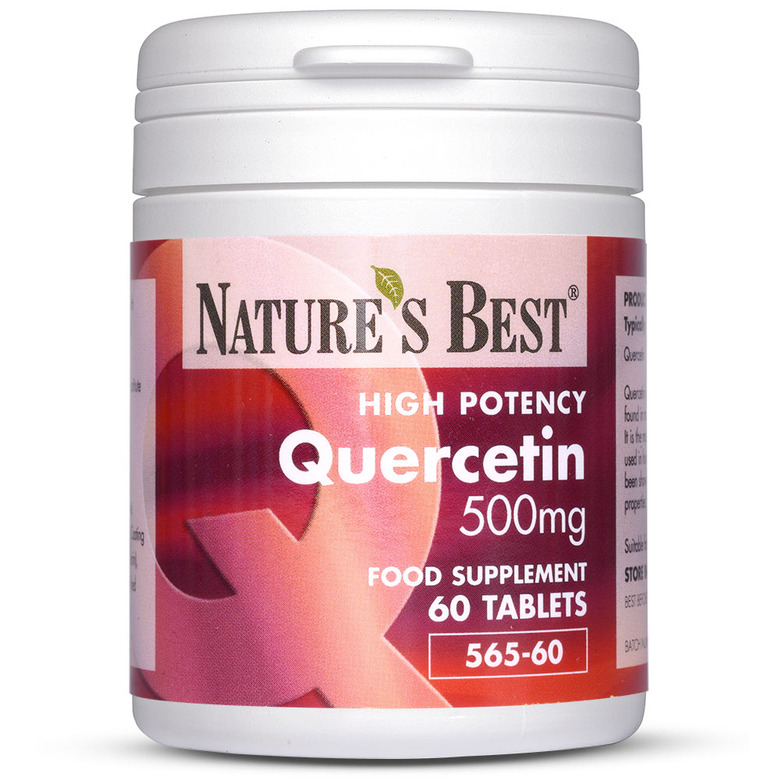
- Brand: Nature's Best
- Dosage Form: Tablet
- Dose: 1 tablet per day, preferably with a meal
- Servings Per Container: 60 servings
- Concentration Per Serving: 500mg of Quercetin Dihydrate per tablet.
- Count: 60 capsules
- Suitable For: Adults, vegetarians
- Other Ingredients: Cellulose, calcium carbonate, stearic acid, silicon dioxide
- Additional Features: Non-GMO, gluten-free, vegan-friendly
Nature's Best opines that quercetin is the bioflavonoid that has been subjected to the most research, and the potential health advantages of this flavonoid have impressed scientists.
They assert that their brand's efficacy in supporting cardiovascular health was established in a recent study and urge the users to learn more about the nutrient on the internet.
Each packet of Nature's Best High Potency Quercetin contains 60 easily absorbed tablets of 500 milligrams of quercetin. The product is gluten-free and suitable for adults and vegetarians.
According to the manufacturers, the product has antioxidant characteristics and helps to prevent the body's synthesis and release of histamines.
This supplement is significantly more potent than apples since an apple typically comprises between 5 and 10 milligrams of quercetin.
Nature's Best shows off a pure quercetin product in a form that's readily absorbed.
Pros
- Oral consumption of quercetin before exercise reduces fatigue and improves one's capacity to exercise.
- It has anticancer and antiinflammatory properties.
Cons
- Extremely high doses of quercetin can harm the kidneys.
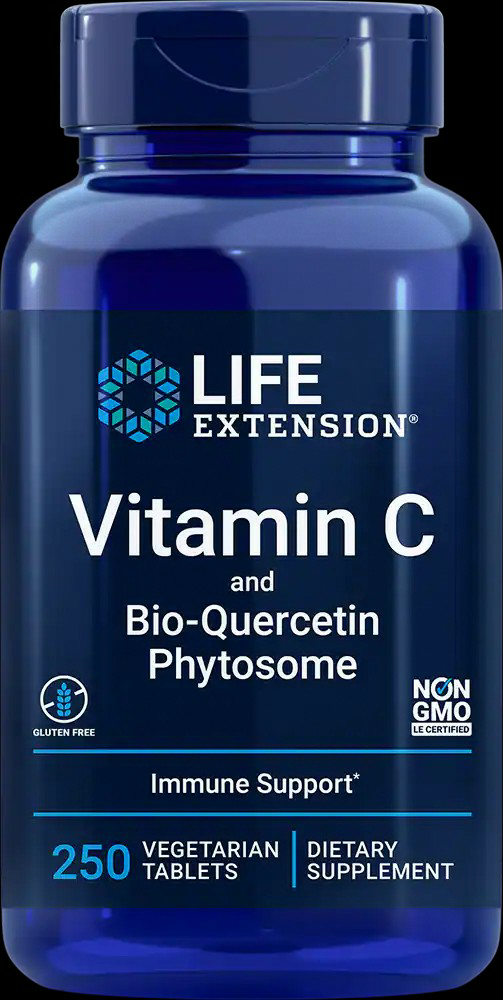
- Brand: Life Extension
- Dosage Form: Tablet
- Dose: 1 capsule per day, preferably with a meal
- Servings Per Container: 250 servings
- Concentration Per Serving: Vitamin C (ascorbic acid) 1000 mg powder per Capsule.
- Count: 250 tablets
- Suitable For: Adults, at least 18 years old.
- Other Ingredients: Microcrystalline cellulose, stearic acid, croscarmellose sodium, vegetable stearate, silica, coating (hydroxypropyl methylcellulose, glycerin).
- Additional Features: Non-GMO, gluten-free
According to Life Extension, consuming vitamin C through food or taking it as a supplement to meet your body's requirements is vital. This guideline exists because the body can't manufacture vitamin C alone.
To solve the problem of vitamin C deficiency, Life Extension Vitamin C & Bio-Quercetin Phytosome exerts the biological action of vitamin C through flavonoid quercetin.
Thus, it may possess numerous positive vascular health effects.
Each supplement pack holds 250 vegetarian tablets containing 1000 mg of vitamin C and 15 mg of bio-quercetin phytosome.
The product's manufacturers claim to source vitamin C and bioflavonoids from fruits (particularly citrus fruits) and vegetables to support the cardiovascular system.
Furthermore, Life Extension Vitamin C & Bio-Quercetin Phytosome comprises ultra-absorbable quercetin, which enhances the immune system and provides other benefits.
A randomized controlled trial demonstrated that the supplement helped athletes to reduce stress and inflammation.
Similarly, double-blind clinical trials showed that its quercetin constituent effectively reduced oxidative stress, promoted a healthy inflammatory response, and maintained overall health.
Pros
- It supports immune health.
- It helps in collagen production, a healthy cardiovascular system and more.
Cons
It may cause some serious side effects if overused.
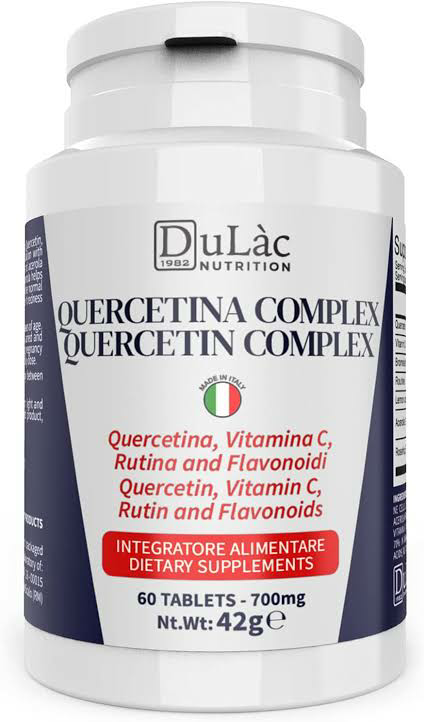
- Brand: Dulàc Nutrition
- Dosage Form: Tablet
- Dose: 1 capsule per day, preferably with a meal.
- Servings Per Container: 60 servings
- Concentration Per Serving: Each tablet contains 200 mg of quercetin, antioxidant and anti-inflammatory flavonoid.
- Count: 60 Tablets
- Suitable For: Adults at least 18 years old
- Other Ingredients: Magnesium salts of fatty acids, rutin, lemon, and orange bioflavonoids.
- Additional Features: Non-GMO, gluten-free.
Dulàc Nutrition Quercetina Complex is an Italian flavonoid supplement brand. The product possesses a relatively high concentration of active antioxidant and anti-inflammatory flavonoids.
Using decent materials and cutting-edge technology, its manufacturers cooked up high-quality dietary supplements that could form a part of nutritious meals.
Each 700 mg tablet of Dulàc Nutrition Quercetina Complex contains quercetin (200 mg), rutin, vitamin C, and bioflavonoids.
The product's manufacturers reportedly adhere to strict guidelines to ensure that their brand is of utmost quality and designed to improve the user's health.
Pros
- It may strengthen the immune system.
- Its antioxidant effects protect the cells from the degenerative action of free radicals.
Cons
- It could cause some serious adverse effects when taken in excess.
Conclusion
Flavonoids are found in high concentrations in meals derived entirely from plants, including but not limited to colorful fruits and vegetables, tea, red wine, herbs, and legumes.
Their antioxidant and anti-inflammatory activities may help to protect you from a wide range of diseases, including cardiovascular diseases, cancer, and neurodegenerative diseases. They may also have other positive effects on your health that are still being studied.
Although supplementation could benefit those with specific health conditions, it isn't required for most people. Flavonoid supplements may pose more potential risks than benefits. The most effective way to gain the countless health benefits of flavonoids is to consume a wide range of foods rich in flavonoids.
FAQ
Are Flavonoid Supplements Worth Using?
Taking flavonoid supplements may benefit individuals with certain health issues. However, independent research has demonstrated that many supplements, including flavonoids, don't contain what they claim to contain.
How Much Flavonoid Supplements Should You Take Daily?
According to the findings of the National Health and Nutrition Examination Survey (NHANES), adults' daily consumption of flavonoids ranges from 200 to 250 milligrams on average.
References
- 1. National Institute of Health: The Effects of Flavonoids on Cardiovascular Health
- Verywell Fit: Benefits and Risks of Flavonoid Supplements
- ResearchGate: Antioxidant properties of flavonoids
- ScienceDirect: The beneficial health effects of flavonoids on the cardiovascular system
- NCBI; Flavonoids and Their Anti-Diabetic Effects
- NCBI: Flavonoids, Inflammation and Immune System
- American Journal of Clinical Nutrition: Can dietary flavonoids play a role in Alzheimer's disease risk prevention?
- JIM: Tea flavonoids for bone health: from animals to humans
- PubMed: Effects of hesperidin in orange juice on blood
- PubMed: Dietary Flavonoid Intake and Smoking-Related Cancer Risk
- National Cancer Institute: Legume, Soy, Tofu, and Isoflavone Intake and Endometrial Cancer Risk in Postmenopausal Women
- NCBI; Therapeutic Potential of Flavonoids in Pain and Inflammation
- ScienceDirect: Dietary flavonoids: Effects on xenobiotic and carcinogen metabolism
- NCBI: Antimicrobial activity of flavonoids
- NCBI: Therapeutic Potential of Quercetin: New Insights and Perspectives for Human Health
- NCBI: Food & Nutrition Research article
- PubMed: Potential health impacts of excessive flavonoid intake
⚠️Disclaimer: The information provided on this health blog is for informational purposes only and is not intended as a substitute for professional medical advice, diagnosis, or treatment. Always seek the advice of your physician or other qualified health provider with any questions you may have regarding a medical condition.
